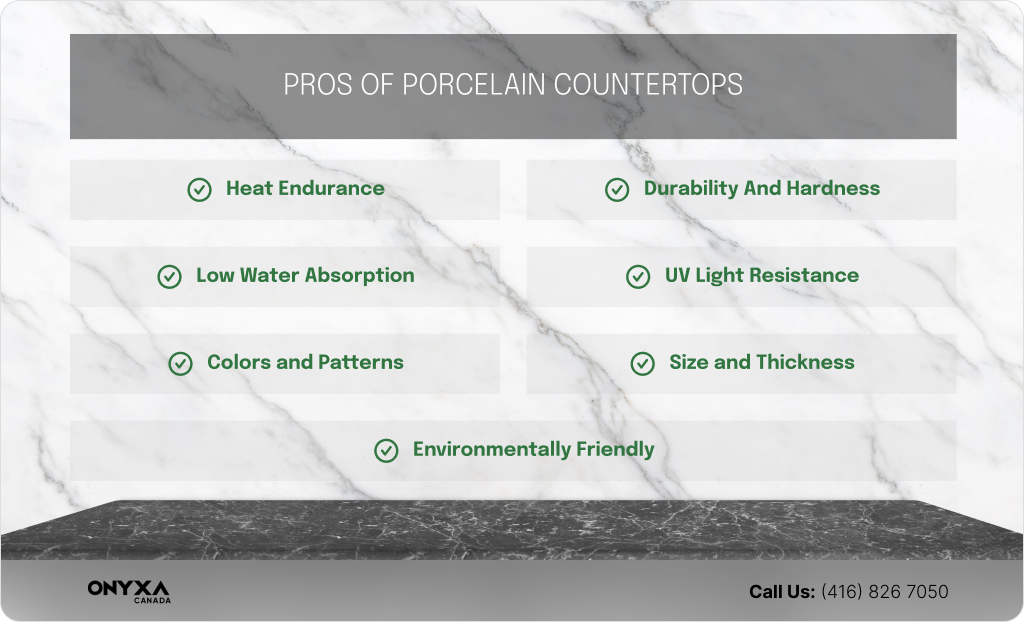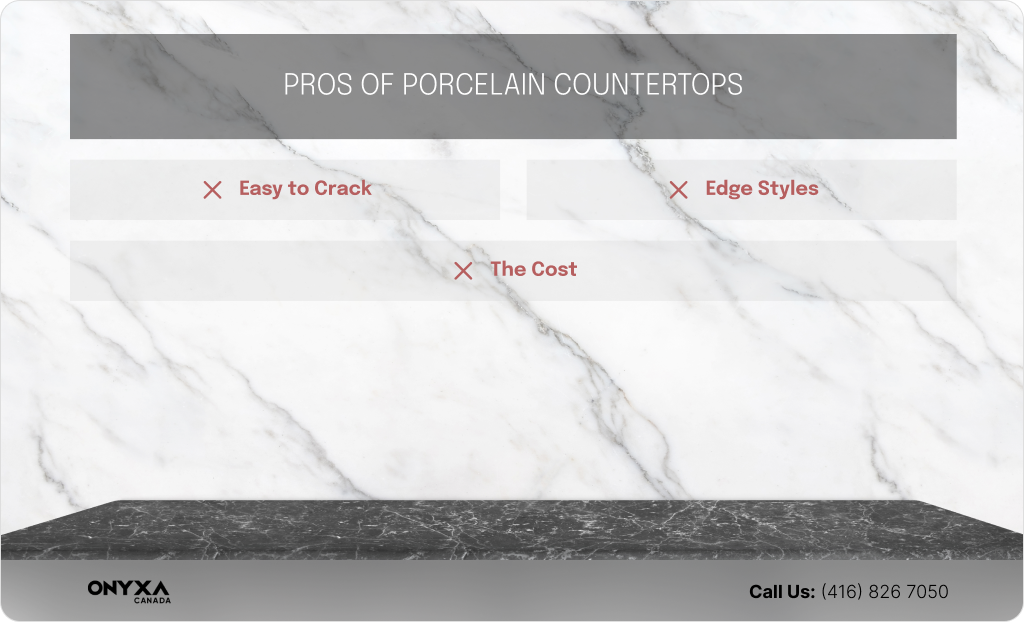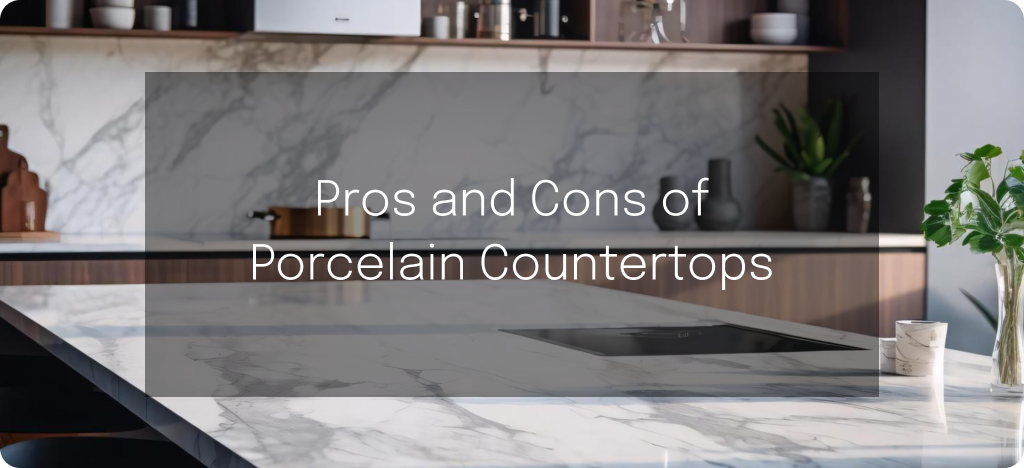Pros and Cons of Porcelain Countertops – Ultimate Guide
Choosing the right material for your kitchen or bathroom countertops is crucial for balancing aesthetics and functionality in your space. Porcelain countertops are popular for their elegant appearance and strong performance characteristics. This guide carefully reviews the benefits and limitations of porcelain countertops, equipping you with the necessary information to make an informed decision. Explore these details with Onyxa to determine if porcelain is the right choice for your design needs.
What are Porcelain Countertops?
Porcelain countertops bring the timeless beauty of porcelain into your living space. Each piece is meticulously crafted from slabs that are cut, shaped, and polished to precisely fit the design dimensions of your area. These countertops offer a sleek and modern look and leverage the intrinsic properties of porcelain—durability, resistance to stains, and low maintenance. Ideal for both kitchens and bathrooms, porcelain provides an elegant yet practical solution that meets the demands of daily use while maintaining its allure over time.
Pros of Porcelain Countertops

Heat Endurance
Porcelain countertops are excellent for their extreme heat resistance; this makes them the best for a kitchen full of hot pots and pans. While most other materials in countertops need pads or trivets for protection from heat, porcelain is high-fired at an extremely hot temperature of above 1200°C and, therefore, can tolerate direct contact with heat without harm. This attribute simplifies cooking tasks and elevates the functionality of your kitchen space.
Durability and Hardness
No other material surpasses the durability of porcelain countertops. This material is made to resist chips, cracks, and daily scratches under the normal conditions of a kitchen. The density and toughness of porcelain and its adaptability to strong heat make it almost indestructible. Compared to something like quartz or granite, porcelain offers a very attractive mixture of hardness and resilience, ensuring decades of service to your countertops.
Low Water Absorption
Another great benefit of porcelain is its low capacity for water absorption, which is useful for materials most exposed to falls and moisture. This characteristic makes the porcelain countertop practically unstainable and antibacterial, thus giving a hygienic surface for food preparation. The front side is designed to have fun against whatever everyday life throws at it, so homeowners don’t have to worry about a surface spill of wine, coffee, or oil soaking in.
Easy Maintenance
Ease of maintenance is a key consideration for any countertop material, and porcelain excels in this area. It requires no sealing or special cleaners — a simple wipe with a damp cloth, and mild detergent is all it takes to keep porcelain countertops looking new. This low-maintenance aspect and its durability make porcelain an attractive option for busy households.
UV Light Resistance
A significant advantage is that porcelain can resist UV light, which makes it suitable for use in kitchens exposed to much natural light. Unlike other materials, which are easily prone to fading or becoming discolored by the sun, porcelain defies them to keep its true color and pattern for many years. This makes it ideal for hot, sunny areas to keep the countertops radiant and the original color.
Colors and Patterns
Improved manufacturing techniques have enabled manufacturers to develop designs that look exactly like natural stone, wood, etc. Perhaps this is one of the most appealing sides of porcelain countertops. A range of colors and patterns is possible. Its design will give one a variety of choices, ranging from classic marble designs to even those imitating wooden ones, literally making it perfect.
Size and Thickness
Porcelain comes in larger-sized slabs with minimal seams, giving your countertops a clean fluid-like look. The product is also available in a traditional width slab, with customization pieces based on design preferences or functional requirements. This versatility in size and thickness makes porcelain adaptable to minimalist and bold design schemes.
Environmentally Friendly
Last but not least, porcelain countertops are environmentally friendly. This material is made from a bountiful amount of naturally occurring resources, and the energy efficiency of its production has slowly improved with every step toward improvement. Furthermore, porcelain is 100% recyclable, lessening the environmental impact and making it an environmentally sustainable choice for nature-loving homeowners.
Cons of Porcelain Countertops
While porcelain countertops offer numerous benefits, there are also some considerations to consider.

Easy to Crack
Although porcelain countertops are relatively indestructible, heavy impacts could cause the material to crack if not installed properly. This is why you would need to hire professional porcelain countertop installation personnel, who will do the job for you without necessarily having cracks during the installation. You should not load the countertop overhangs or unsupported areas with much weight.
Edge Styles
It is rather restricted in the possibility of different edge designs compared to materials like granite or quartz. For instance, other materials during fabrication, like granite, for example, could obtain far more options for edge profiles than porcelain. But the manufacturers have devised an ingenious solution: the mitered edges, which could give the appearance of a thicker slab and provide a refined finish.
The Cost
Porcelain countertops can be much more expensive than other materials, depending on the design’s complexity and installation requirements. Though a front cost may be high in general, this is certainly not true in the case of porcelain, and consumers will be rewarded in the long run with low material maintenance costs because of its longevity.
How to Choose the Best Porcelain Countertop?
Selecting the ideal porcelain countertop for your kitchen involves more than just picking out a color or pattern; it’s about finding the perfect balance of quality, cost, design, and installation. Start by ensuring you choose a high-grade porcelain, which guarantees the durability to withstand daily kitchen activities and the longevity to maintain its allure over time. The aesthetic alignment of the countertop with your kitchen’s design is crucial. Consider how the color and pattern of the porcelain will complement the existing decor and lighting of your space.
Additionally, the thickness and finish of the porcelain can significantly impact the look and functionality of your countertop. Opt for a matte finish for a more contemporary look or a glossy finish to brighten the space and reflect more light. Partnering with a reputable supplier is key, as they can provide a wide range of options and advice tailored to your specific needs. Equally important is choosing a skilled installer who will ensure precise measurement, cutting, and fitting of the porcelain, avoiding any potential installation mishaps that could affect the countertop’s performance and appearance.
By carefully considering these elements, you will enhance your kitchen’s functionality and its overall aesthetic appeal, making your porcelain countertop a central feature of your home’s heart.
Conclusion
Porcelain countertops masterfully combine elegance, resilience, and functionality, making them a superior choice for contemporary kitchens and bathrooms. Although some considerations remain, like their susceptibility to cracking if not properly installed and somewhat restricted edge styling options, the benefits substantially overshadow these minor drawbacks. Opting for porcelain allows you to invest in a visually appealing and enduring surface that offers a sustainable and easy-to-maintain solution, enhancing your home’s overall value and aesthetic. Embrace porcelain countertops as a smart, stylish choice that will delight and serve you for years to come.
ONYXA, A trusted brand recognized for supplying quality stones, provides a comprehensive comparison to help you navigate this choice. Elevate your home with the beauty and durability of Onyxa’s porcelain slabs and natural stones. Your luxurious Toronto home is just a selection away.
+1 (416) 854.8645
FAQ
Are porcelain countertops more expensive than granite?
- Porcelain and high-end granite countertops often come with similar price tags. However, factors like design complexity and installation specifics can influence the final cost.
Can chips or cracks in porcelain countertops be repaired?
- Yes, minor damage to porcelain countertops can typically be fixed by professionals. The success of repairs depends on the countertop’s pattern and color, with some fixes blending in better than others.
What’s the best way to maintain porcelain countertops?
- Keeping porcelain countertops pristine is easy with a soft cloth and mild detergent. Avoid abrasive cleaners and scouring pads that could scratch the surface.
Can porcelain countertops withstand outdoor use?
- Absolutely! With its UV resistance and durability, porcelain is an excellent choice for outdoor kitchens, maintaining its color and integrity even in the elements.
Is it safe to chop directly on porcelain countertops?
- While porcelain is highly scratch-resistant, it is advisable to use a cutting board to protect both the countertop and your knives.
Are porcelain countertops eco-friendly?
- Yes, porcelain is environmentally conscious. It is made from natural materials and is fully recyclable, appealing to those seeking sustainable home options.
How well does porcelain handle the heat?
- Porcelain excels in heat resistance, allowing for the direct placement of hot pots and pans without damage, ideal for busy kitchens.
Can I customize the appearance of my porcelain countertop?
- Indeed! Porcelain offers versatile design options, with modern techniques enabling a wide range of colors and patterns, including natural stone or wood imitations, for a personalized touch.
